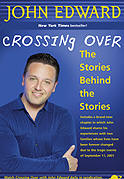Perceptions of Spirituality
“To ride on a broomstick and fly: combine belladonna leaves, stramonium, munkshood, and celery seeds to make an ointment. Add one toad and boil until the skin falls off the bones.  Strain and apply the ointment to the body.” This seventeenth century formula, as told by Jeanne Rose in her book “Herbs and Things”, is indicative of what many people, even today, envision a psychic to be associated with.
Strain and apply the ointment to the body.” This seventeenth century formula, as told by Jeanne Rose in her book “Herbs and Things”, is indicative of what many people, even today, envision a psychic to be associated with.
Although, certainly, they may not think the ingredients are made up of such things as toads and bat wings, many people do believe that those who are openly psychic are ‘devil worshippers’ and practitioners of ‘black magic.’ Nothing could be farther from the truth. In fact, words like “new age,” “metaphysics,” “psychic” “paganism” and “occult” are merely spiritual belief systems which fall outside of the widely accepted ‘organized’ religions, such as Christianity.
Just as organized religions have their ‘tools’ that they use for rituals, such as the rosary in Catholicism, or the menorah in Judaism, many metaphysicians have tools to practice their craft and beliefs. One of the tools is “The Tarot.”
The tarot reader interprets cards of various symbolic drawings and combines that interpretation with her or his psychic abilities to gain a greater understanding of the unconscious mind. Geri, a Catholic raised, non-denominational minister, uses the Tarot as her main tool. When she was asked how people perceive her, she said, “…there are the ones who raise their eyebrows in terror. They think you’re going to cast a spell on them because they immediately label you a witch.” Contrary to that belief, however, many psychics are everyday people in everyday clothes, working everyday jobs, living everyday lives. Furthermore, these people are coming out of the closet, so to speak, using the tools of the trade, making metaphysics a viable part of life in our current world.
Today a common name for it is “New Age.” Some people call it “self-spirituality,” “new spirituality” or “new age religion,” but whereas religions are organized, “new age” is more of a ‘movement.’ Furthermore, in many organized religions, there is pressure to make others convert. New Age believers rarely subscribe to that. Geri sees it as “a complete psychological and philosophical system,” and as a way of giving people the freedom to believe in whatever they choose. “It gives you the freedom to be you,” she explains.
Ann, a reader who uses runes as her tool, sees her readings as a result of her beliefs. She defines her beliefs in this way:  “We’re not a religion; to me it’s a philosophy.” She believes, as many with an interest in metaphysics do, that her beliefs are hers and that other people’s are theirs. She thinks that no one has the right to judge other people and their views on life. “The only person you have to account to is yourself,” she says, and stresses that because she’s learned to communicate with her ‘higher self’ there is no need for a middle-man, such as a Pope or a Rabbi. Additionally, even though she agrees that many religions teach good things, she expresses her beliefs this way: “I don’t think his way is any wiser than what I believe; I have the same contact with the good Lord as he has…I don’t feel like I’m anybody’s disciple.”
“We’re not a religion; to me it’s a philosophy.” She believes, as many with an interest in metaphysics do, that her beliefs are hers and that other people’s are theirs. She thinks that no one has the right to judge other people and their views on life. “The only person you have to account to is yourself,” she says, and stresses that because she’s learned to communicate with her ‘higher self’ there is no need for a middle-man, such as a Pope or a Rabbi. Additionally, even though she agrees that many religions teach good things, she expresses her beliefs this way: “I don’t think his way is any wiser than what I believe; I have the same contact with the good Lord as he has…I don’t feel like I’m anybody’s disciple.”
This is not to say, however, that Ann doesn’t keep an open mind. She takes the ideas and philosophies that work for her, leaves the rest, and doesn’t feel threatened when others have the same view of her beliefs. What are her beliefs? She believes in peaceful coexistence.
Each one [religion] has to be the one because they are afraid of the other guy; whereas, if we could all live next to each other…everybody just does their thing, believes in their own thing, as long as they don’t try to make the other one believe in the same…but, that doesn’t make for bigger populations in your religion unless you try to convert–or wipe everyone else out.
The latter has been the cause of wars for centuries.
The philosophies that New Age is loosely structured around stem from ancient far eastern religions. The idea is that all people need only to look within themselves to find the higher spiritual source that they search for. Kahlil Gibran, author of The Prophet, explains it in this way:
It is enough that you enter the temple invisible.
I can not teach you how to pray in words.
God listens to your words save when He
Himself utters them through your lips.
These lines seem to embody a very basic metaphysical belief–the belief that God, as each person perceives Her or Him to be, lives within that person, and that one must listen to oneself to truly find her or his own Higher Spirit.
One of the problems that psychics and believers of this type of ideology have are the pre-conceived notions that uninformed people have about those with alternative philosophies.  In his book, “The Kabbalah”, Ponce states, “The commonly accepted picture of a mystic–or anyone for that matter who consciously seeks to find meaning on life–as a self-indulgent escapist has also contributed much to the misunderstanding of mysticism in general”.
In his book, “The Kabbalah”, Ponce states, “The commonly accepted picture of a mystic–or anyone for that matter who consciously seeks to find meaning on life–as a self-indulgent escapist has also contributed much to the misunderstanding of mysticism in general”.
The word “mysticism” is key here. The word relates to the word mystery: “something unexplained, unknown, or kept secret” (Webster’s). This suggests that it is really only a mystery to those who are uninformed about the subject of metaphysics. Yet, a shroud of mystery is pervasive. When asked how he generally perceives psychics, Tim, a college student who has never had a psychic reading, yet is very open-minded and curious about them, stated, “For some reason, in my mind’s eye, I’ve always seen them as gypsy type ladies, women of mystique. Of course, they’re attractive, too. They just have to be attractive for some reason.” This idea is not surprising, considering the multitude of movies and television programs that portray psychics in that very, stereotypical role.
There’s quite a difference, however, between those who are curious and those who are staunch non-believers. Tim, our college student, expresses a desire to learn more about the roots of metaphysics, specifically the Tarot, and wants to form a more reasonable understanding about it. “I know it’s not just card reading.” He states, “There’s got to be more to it than that.” In contrast, Susan, a church-going Christian, believes that the whole idea is the work of the Devil and that opening oneself up to psychic powers is opening oneself up to the evil forces that he brings.
Perhaps she is not completely wrong. It is for that precise reason that psychics have their own personalized rituals that they use for protection against those unknown forces, much like Native Americans did when they burned sage for protection.  That ritual is still in use by many who practice metaphysics today.
That ritual is still in use by many who practice metaphysics today.
The Tarot, runes (or stones), palmistry, and the crystal ball are all just tools that are used by psychically gifted people to tap into their power. Many psychics believe, however, that everyone has that power, more commonly known as a “sixth sense,” but that they are just not aware of it, or have just not developed it. For Geri, “It’s basically for personal growth through meditation with the [tarot] cards,” which she feels gives her direction and guidance. That, too, is what many people go to readers for, even though it may be a little scary at first.
Meg, an R.N., states she had never been read, but recently went to a seance for the first time where she was told by the medium (a person who communicates with spirits who have passed on) things that Meg knew the medium couldn’t have known any other way but telepathically. She thinks that with the ‘law of averages’ people can’t just pick things out of the air like that and be right, unless there is something more. When asked how she might feel getting a personal reading of some kind, she said, “I’m frightened [because] I just can’t explain it. But, I really can’t disbelieve it because it’s so odd.” She doesn’t feel so much that something will happen to her; rather, she is more afraid of finding out something that she really doesn’t want to know.
Meg’s perception of psychics is somewhat the same. When someone tells her about being psychic, she says she feels “…they can look right through you and know your inner feelings and inner thoughts.” She agrees that maybe she gives them credit for more power than they really have. This is not surprising though; the seed was planted early.
Although Meg stated that she had never been read, actually she had been, and just hadn’t recognized it. She relayed a story about what sounded like some sort of vagabond at the Five and Dime in Chicago, where she grew up. For a dollar, he would correctly tell the serial numbers on it. For a dollar more, he would let the people write three questions on a slip of paper, which he would then answer. Meg was at an impressionable age at the time, about 16 years old, and she wanted a car, but she did not include it in her three questions. He answered her three written questions and then, as she was leaving, he said, “Oh yeah, don’t worry. You’re going to get that car you want.” It made such an impression on her that she tried to get her mother to go back with her, to no avail. She, herself, went back to look for the man, but he was gone, never again to be found.
“New Age” is not new. As Geri says, “It is just the current name. With each generation it’s becoming more acceptable.” In fact, she ascertains that she has read of it being called “New Age” as far back as the early 1800’s; before that, people were hanged because of it. That shows that even though tactics may have changed, human nature surely hasn’t.
Throughout history, most of the major wars have been rooted in and fought over religious beliefs. Even today, we are in a war with fundamentalist underpinnings. The Middle East has not seen peace for many people’s lifetimes and it continues to either spread or move around. Why? Because those ethnocentric people are threatened by, and demonize, anyone who doesn’t have identical beliefs, organized religion or not.
But those who eschew organized religion and are involved in spiritual and psychic beliefs are not the “devil worshippers” portrayed in the movies and in modern propaganda. To the contrary. Most are just everyday people want to live their lives in the best way that they know how, and they are willing to let others do the same. It seems like a fair enough proposition.

 As tarot readers, psychic/mediums, animal communicators, and any other type of telepathic practitioners, we are expected to be 100% accurate, 100% of the time. And, if we are not – which nobody could possibly be – then we are nothing more than charlatans and frauds.
As tarot readers, psychic/mediums, animal communicators, and any other type of telepathic practitioners, we are expected to be 100% accurate, 100% of the time. And, if we are not – which nobody could possibly be – then we are nothing more than charlatans and frauds.
 I’ve read tarot for more years than I’d like to admit. I’ve spoken with animals for more years than I regularly acknowledge, I am, however, somewhat new to mediumship. I’ve been ‘speaking to the human dead’ for about a year now.
I’ve read tarot for more years than I’d like to admit. I’ve spoken with animals for more years than I regularly acknowledge, I am, however, somewhat new to mediumship. I’ve been ‘speaking to the human dead’ for about a year now.  Every day I learn a little more about connecting with those who have crossed, but the pervasive message that keeps coming back is the last line I wrote of his: Appreciate the messages you get. But not only appreciate them, be open to them so that you may appreciate them.
Every day I learn a little more about connecting with those who have crossed, but the pervasive message that keeps coming back is the last line I wrote of his: Appreciate the messages you get. But not only appreciate them, be open to them so that you may appreciate them.  I didn’t really feel like going shopping on the day before Independence
I didn’t really feel like going shopping on the day before Independence I met a woman with a tuxedo cat (Peter) whom she got from the pound. She
I met a woman with a tuxedo cat (Peter) whom she got from the pound. She But make no mistake, my little shopping excursion was a
But make no mistake, my little shopping excursion was a
 It was so strange. And then it hit me. I honestly believe I was talking to a friend of mine who died of breast cancer several years ago. She and “L” were so much alike, but it was more than that. When I left, and realized who she reminded me of, I didn’t start feeling sad, missing my friend (she and I had been very close), I felt like I just had the opportunity to speak with her. It wasn’t sad to think of her not here anymore, I felt joyful like I had just been able to see her.
It was so strange. And then it hit me. I honestly believe I was talking to a friend of mine who died of breast cancer several years ago. She and “L” were so much alike, but it was more than that. When I left, and realized who she reminded me of, I didn’t start feeling sad, missing my friend (she and I had been very close), I felt like I just had the opportunity to speak with her. It wasn’t sad to think of her not here anymore, I felt joyful like I had just been able to see her.  The importance of healthy communication cannot be underestimated. In this sometimes emotionally stunted society of ours, we have downplayed the importance of interpersonal communication to the point where it affects not only our own health, but the health of others. (In some cases, it affects your health because others are unwilling to communicate with you. — I will write on psychic vampires [those who suck your emotions dry] at a later time.)
The importance of healthy communication cannot be underestimated. In this sometimes emotionally stunted society of ours, we have downplayed the importance of interpersonal communication to the point where it affects not only our own health, but the health of others. (In some cases, it affects your health because others are unwilling to communicate with you. — I will write on psychic vampires [those who suck your emotions dry] at a later time.) Nonassertion: The “inability or unwillingness to express thoughts or feelings.” (Adler & Towne, 2004) This style stems from low self-esteem or lack of knowledge of other communication styles (ie: it was not modeled for them).
Nonassertion: The “inability or unwillingness to express thoughts or feelings.” (Adler & Towne, 2004) This style stems from low self-esteem or lack of knowledge of other communication styles (ie: it was not modeled for them).  Passive aggressiveness can come in many forms: people who avoid conflict altogether; those who say they understand your feelings but continue to act with the same intent; those who lay guilt trips on you; those who ‘hit below the belt’ with intimate knowledge they know will upset you; those who give you the ‘silent treatment’; those who make a joke about everything and those who tell you they will help you, but sabotage you in some way. If confronted, the passive-aggressive person often just denies intent.
Passive aggressiveness can come in many forms: people who avoid conflict altogether; those who say they understand your feelings but continue to act with the same intent; those who lay guilt trips on you; those who ‘hit below the belt’ with intimate knowledge they know will upset you; those who give you the ‘silent treatment’; those who make a joke about everything and those who tell you they will help you, but sabotage you in some way. If confronted, the passive-aggressive person often just denies intent.  Respect Boundaries: If you know that something is a ‘hot-button issue’ don’t throw it in their face. Disrespecting boundaries is one of the quickest ways to escalate a conflict.
Respect Boundaries: If you know that something is a ‘hot-button issue’ don’t throw it in their face. Disrespecting boundaries is one of the quickest ways to escalate a conflict.  The method by which you do that, however, can only be found by your own introspection and assessment of how important that specific relationship is to you. If you are being hurt, and you have sincerely tried every option to stop the incoming behavior, you need to make some decisions about how important the relationship is to you.
The method by which you do that, however, can only be found by your own introspection and assessment of how important that specific relationship is to you. If you are being hurt, and you have sincerely tried every option to stop the incoming behavior, you need to make some decisions about how important the relationship is to you. In fact, all of these things have something in common; in excess, they may all be symptoms of having grown up in a dysfunctional environment.
In fact, all of these things have something in common; in excess, they may all be symptoms of having grown up in a dysfunctional environment. John Bradshaw, a counselor, lecturer, and author of Healing The Shame That Binds You, and Bradshaw On The Family, said it this way, “Compulsive/addictive behavior is a pathological relationship to any mood altering experience that has life-damaging consequences.” Hence, addictive behavior does not have to be solely confined to drugs and alcohol. Pete Rose, one of the finest and most passionate baseball players of his time, was kicked out of baseball because of gambling. Clearly, his gambling problems had life-damaging consequences; they cost him his one great love of life!
John Bradshaw, a counselor, lecturer, and author of Healing The Shame That Binds You, and Bradshaw On The Family, said it this way, “Compulsive/addictive behavior is a pathological relationship to any mood altering experience that has life-damaging consequences.” Hence, addictive behavior does not have to be solely confined to drugs and alcohol. Pete Rose, one of the finest and most passionate baseball players of his time, was kicked out of baseball because of gambling. Clearly, his gambling problems had life-damaging consequences; they cost him his one great love of life!  Some people who have grown up in extremely violent and/or abusive households build up so much rage that they just explode as is evidenced daily on the television screen, the internet and the pages of newspapers nationwide. It’s very easy to say that Eric Harris and Deren Kleebold were affected by Marilyn Manson and video games, because they both had two parents and drove BMWs. But no one knows what goes on behind the walls of a house except the people who live in that house. For far too long this country’s obsession with “family values” has decimated any hope of looking at the parents in cases such as Columbine and Virginia Tech. It’s time to at least start asking the question.
Some people who have grown up in extremely violent and/or abusive households build up so much rage that they just explode as is evidenced daily on the television screen, the internet and the pages of newspapers nationwide. It’s very easy to say that Eric Harris and Deren Kleebold were affected by Marilyn Manson and video games, because they both had two parents and drove BMWs. But no one knows what goes on behind the walls of a house except the people who live in that house. For far too long this country’s obsession with “family values” has decimated any hope of looking at the parents in cases such as Columbine and Virginia Tech. It’s time to at least start asking the question.  Strain and apply the ointment to the body.” This seventeenth century formula, as told by Jeanne Rose in her book “Herbs and Things”, is indicative of what many people, even today, envision a psychic to be associated with.
Strain and apply the ointment to the body.” This seventeenth century formula, as told by Jeanne Rose in her book “Herbs and Things”, is indicative of what many people, even today, envision a psychic to be associated with.  “We’re not a religion; to me it’s a philosophy.” She believes, as many with an interest in metaphysics do, that her beliefs are hers and that other people’s are theirs. She thinks that no one has the right to judge other people and their views on life. “The only person you have to account to is yourself,” she says, and stresses that because she’s learned to communicate with her ‘higher self’ there is no need for a middle-man, such as a Pope or a Rabbi. Additionally, even though she agrees that many religions teach good things, she expresses her beliefs this way: “I don’t think his way is any wiser than what I believe; I have the same contact with the good Lord as he has…I don’t feel like I’m anybody’s disciple.”
“We’re not a religion; to me it’s a philosophy.” She believes, as many with an interest in metaphysics do, that her beliefs are hers and that other people’s are theirs. She thinks that no one has the right to judge other people and their views on life. “The only person you have to account to is yourself,” she says, and stresses that because she’s learned to communicate with her ‘higher self’ there is no need for a middle-man, such as a Pope or a Rabbi. Additionally, even though she agrees that many religions teach good things, she expresses her beliefs this way: “I don’t think his way is any wiser than what I believe; I have the same contact with the good Lord as he has…I don’t feel like I’m anybody’s disciple.”  In his book, “The Kabbalah”, Ponce states, “The commonly accepted picture of a mystic–or anyone for that matter who consciously seeks to find meaning on life–as a self-indulgent escapist has also contributed much to the misunderstanding of mysticism in general”.
In his book, “The Kabbalah”, Ponce states, “The commonly accepted picture of a mystic–or anyone for that matter who consciously seeks to find meaning on life–as a self-indulgent escapist has also contributed much to the misunderstanding of mysticism in general”.  That ritual is still in use by many who practice metaphysics today.
That ritual is still in use by many who practice metaphysics today.